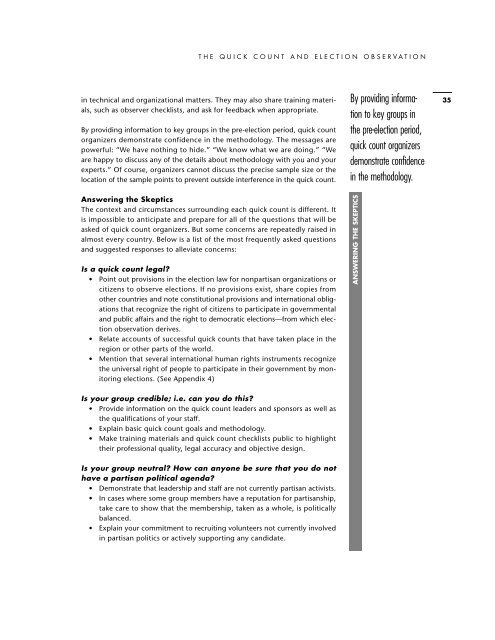The Quick Count and Election Observation
The Quick Count and Election Observation
The Quick Count and Election Observation
You also want an ePaper? Increase the reach of your titles
YUMPU automatically turns print PDFs into web optimized ePapers that Google loves.
THE QUICK COUNT AND ELECTION OBSERVATION<br />
in technical <strong>and</strong> organizational matters. <strong>The</strong>y may also share training materials,<br />
such as observer checklists, <strong>and</strong> ask for feedback when appropriate.<br />
By providing information to key groups in the pre-election period, quick count<br />
organizers demonstrate confidence in the methodology. <strong>The</strong> messages are<br />
powerful: “We have nothing to hide.” “We know what we are doing.” “We<br />
are happy to discuss any of the details about methodology with you <strong>and</strong> your<br />
experts.” Of course, organizers cannot discuss the precise sample size or the<br />
location of the sample points to prevent outside interference in the quick count.<br />
By providing information<br />
to key groups in<br />
the pre-election period,<br />
quick count organizers<br />
demonstrate confidence<br />
in the methodology.<br />
35<br />
Answering the Skeptics<br />
<strong>The</strong> context <strong>and</strong> circumstances surrounding each quick count is different. It<br />
is impossible to anticipate <strong>and</strong> prepare for all of the questions that will be<br />
asked of quick count organizers. But some concerns are repeatedly raised in<br />
almost every country. Below is a list of the most frequently asked questions<br />
<strong>and</strong> suggested responses to alleviate concerns:<br />
Is a quick count legal?<br />
• Point out provisions in the election law for nonpartisan organizations or<br />
citizens to observe elections. If no provisions exist, share copies from<br />
other countries <strong>and</strong> note constitutional provisions <strong>and</strong> international obligations<br />
that recognize the right of citizens to participate in governmental<br />
<strong>and</strong> public affairs <strong>and</strong> the right to democratic elections—from which election<br />
observation derives.<br />
• Relate accounts of successful quick counts that have taken place in the<br />
region or other parts of the world.<br />
• Mention that several international human rights instruments recognize<br />
the universal right of people to participate in their government by monitoring<br />
elections. (See Appendix 4)<br />
ANSWERING THE SKEPTICS<br />
Is your group credible; i.e. can you do this?<br />
• Provide information on the quick count leaders <strong>and</strong> sponsors as well as<br />
the qualifications of your staff.<br />
• Explain basic quick count goals <strong>and</strong> methodology.<br />
• Make training materials <strong>and</strong> quick count checklists public to highlight<br />
their professional quality, legal accuracy <strong>and</strong> objective design.<br />
Is your group neutral? How can anyone be sure that you do not<br />
have a partisan political agenda?<br />
• Demonstrate that leadership <strong>and</strong> staff are not currently partisan activists.<br />
• In cases where some group members have a reputation for partisanship,<br />
take care to show that the membership, taken as a whole, is politically<br />
balanced.<br />
• Explain your commitment to recruiting volunteers not currently involved<br />
in partisan politics or actively supporting any c<strong>and</strong>idate.


